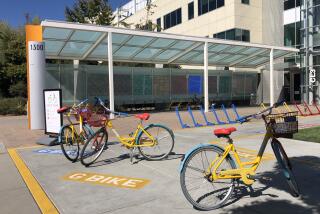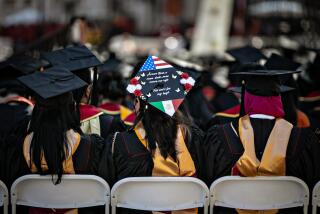The soft sciences matter as much as ever
- Share via
A report released this week bears out what many educators have been predicting: Amid rising college tuition, increased global economic competition and a job market that disproportionately rewards graduates in STEM (science, technology, engineering, math) fields, students are seeking degrees in what they and, indeed, many in our nation view as lucrative business and hard-science disciplines. The study is from the American Academy of Arts and Sciences’ Commission on the Humanities and Social Sciences, on which I serve.
Some institutions have responded by cutting budgets in the arts and humanities and directing those funds elsewhere. That’s the wrong thing to do. The humanities — the study of languages, literature, history, jurisprudence, philosophy, comparative religion, ethics, social sciences — and the arts are vital to our future. We should be investing more funds, more time and more expertise, not less, into these endeavors.
What detractors of the “soft” subjects miss is that the arts and humanities provide an essential framework and context for understanding the wider world. Studying the humanities strengthens the ability to communicate and work with others. It allows students to develop broad intellectual and cultural understanding; it nurtures creativity and deepens participation in public discourse and modern democracy.
Without citizens whose reading, writing, speaking and analytical skills are top-notch, our society as a whole falters. Without artists, sociologists, English majors and political theorists — along with engineers and scientists — to envision what the future looks like, that exciting potential will never be realized. It takes intelligence, passion, imagination and an understanding of what has come before to be a visionary leader. Arts and humanities studies impart these critical life skills.
The commission’s report points out that “at the very moment when China and some European nations are seeking to replicate our model of broad education in the humanities, social sciences and natural sciences as a stimulus to invention, the United States is instead narrowing our focus and abandoning our sense of what education has been and should continue to be — our sense of what makes America great.”
These are the telling statistics: First, that federal funding for helping American students include international training in their education has been cut 41% in four years. That’s an astonishing number. The National Assessment of Educational Progress test shows that less than a quarter of eighth- and 12th-grade U.S. students are proficient in reading, writing and civics.
Yet, according to the report, 3 out of 4 employers now want schools to place more emphasis on the skills that the humanities and social sciences teach: critical thinking and problem solving, as well as written and oral communication.
How can we possibly equip the U.S. for its leadership role in an increasingly connected world if we are not adequately teaching students to communicate and helping them understand and encounter diverse perspectives?
There is no denying that scientific advances have extraordinary power, and that the STEM fields are indispensable. There’s no denying that every area of study needs significant increases in resources to keep up with the changing world. But if we fail to invest in the arts and humanities, our country’s future leaders will neither understand nor be able to act on or illustrate the shared experience of what it is to be human — they won’t have the ability to connect on an emotional level with others. The ability to connect with others is developed by studying the humanities, and in the global community this skill is not optional — it’s essential.
Focusing our educational resources toward any one endeavor in narrow isolation creates a destructive imbalance. We must correct this imbalance now, before it is too late.
This, then, is a critical “teachable moment” and we as a society must embrace it. We must enthusiastically support and fund the study of the arts and humanities as the building blocks of a successful global future. And for everyone concerned with how this translates into a sound economy and a sound financial future, simply recall what Steve Jobs told graduates of Stanford University in 2005: One of the most influential experiences in his brief time at Reed College was his exposure to the fine art of calligraphy. It taught him the important lesson of the relationship between discipline and creativity.
James Cuno is chief executive and president of the J. Paul Getty Trust in Los Angeles. The Humanities and Social Sciences Commission study, “The Heart of the Matter,” is available at the commission website.
More to Read
A cure for the common opinion
Get thought-provoking perspectives with our weekly newsletter.
You may occasionally receive promotional content from the Los Angeles Times.









